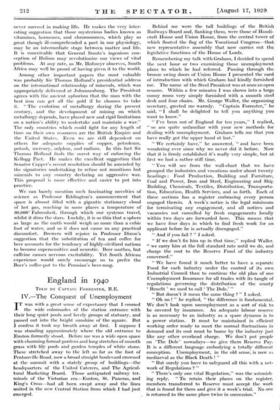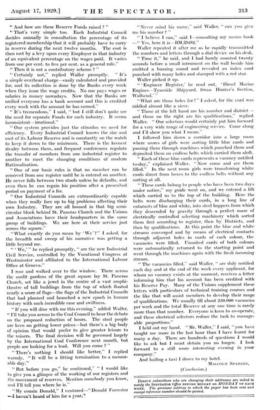England in 1940
TOLD BY CAPTAIN FORRESTER, R.E.
IV.—The Conquest of Unemployment
IT was with a great sense of expectancy that I crossed the wide colonnades of the station entrance with their long quiet pools and lovely groups of statuary, and passed out into the bright sunshine of the square. But I confess it took my breath away at first. I suppose I was standing approximately where the old entrance to Euston formerly stood. Before me was a wide open space with charming formal gardens and long stretches of smooth grass with lily pools and garden temples of white stone. These stretched away to the left as far as the foot of Pentonville Road, now a broad straight boulevard crowned at the summit with a stately group of buildings—the headquarters of the United Caterers, and The Agricul- tural Marketing Board. Those antiquated railway ter- mina's of the Victorian era—Euston, St. Pancras, and King's Cross—had all been swept away and the lines united in the new Central Station from which I had just emerged. Behind me were the tall buildings of the British Railways Board and, flanking them, were those of Handi- craft House and Union House, from the central tower of which floated the flag of the Vocational Congress—that new representative assembly that now carries out the legislative functions of the House of Lords.
Remembering my talk with Graham, I decided to spend the next hour or two examining those unemployment plans to which he had referred. Passing through the bronze swing doors of Union House I presented the card of introduction with which Graham had kindly furnished me. The name of the Steel President was at once an open sesame. Within a few minutes I was shown into a large sunny room very simply furnished with a smooth steel desk and four chairs. Mr. George Waller, the organizing secretary, greeted me warmly. " Captain Forrester," he said, " I shall be delighted to tell you anything you want to know."
" I've been out of England for ten years," I replied, " so am quite unfamiliar with your new methods for dealing with unemployment. Graham tells me that you have really got the upper hand at last."
" We certainly have," he answered, " and have been wondering ever since why we never did it before. Now that it is firmly established it's really very simple, but at first we had a rather stiff time.
" You will see from the wall-chart that we have grouped the industries and vocations under about twenty headings : Food Production, Building and Furniture, Coal and Power, Iron and Steel, Engineering and Ship Building, Chemicals, Textiles, Distribution, Transporta- tion, Education, Health Services, and so forth. Each of these sections has a register embracing every person engaged therein. A week's notice is the legal minimum for terminating any engagement, and all notices and vacancies not cancelled by fresh engagements locally within two days are forwarded here. This means that we have four days in which to find fresh work for an applicant before he is actually disengaged."
" And if you fail ? " I asked.
" If we don't fix him up in that time," replied Waller, " we carry him at the full standard rate until we do, and charge the cost to the Reserve Fund of the industry concerned."
" We have found it much better to have a separate Fund for each industry under the control of its own Industrial Council than to continue the old plan of one Unemployment Insurance for all trades with its tangle of regulations governing the distribution of the scanty ' Benefit ' we used to call ' The Dole.' " " But doesn't it mean the same thing ? " I asked.
" Oh no ! " he replied, " the difference is fundamental. We don't look upon unemployment as a sort of risk to be covered by insurance. An adequate labour reserve is as necessary to an industry as a spare dynamo is to a power station. It must be maintained in efficient working order ready to meet the normal fluctuations in demand and its cost must be borne by the industry just like any other overhead charge. We don't put people on ' The Dole' nowadays—we give them Reserve Pay. It is a different language embodying a totally different conception. Unemployment, in the old sense, is now as mediaeval as the Black Death " " But surely you have to safeguard all this with a net- work of Regulations ? "
" There's only one vital Regulation," was the astonish- ing reply. " To retain their places on the register, members transferred to Reserve must accept the work that is found for them and give it a week's trial. No one is returned to the same place twice in succession." " And how are these Reserve Funds raised ? "
" That's very simple too. Each Industrial Council decides annually in consultation the percentage of its registered membership that it will probably have to carry in reserve during the next twelve months. The cost is then met by a levy upon every Employer in that industry of an equivalent percentage on the wages paid. It varies from one per cent. to five per cent. as a general rule."
" Then it is not a contributory scheme ? "
" Certainly not," replied Waller promptly. " It's a simple overhead charge—easily calculated and provided for, and its collection is done by the Banks every week when they issue the wage credits. No one pays wages or salaries in money nowadays. Now that the Banks are unified everyone has a bank account and this is credited every week with the amount he has earned."
" It's tremendous," I said, " but I still don't quite see the need for separate Funds for each industry. It seems inconsistent—irrational."
" Our system provides just the stimulus we need for efficiency. Every Industrial Council knows the size and cost of its Labour Reserve and is constantly on the watch to keep it down to the minimum. There is the keenest rivalry between them, and frequent conferences regulate the transfer of members from one industrial register to another to meet the changing conditions of modern Rationalisation.
" One of our basic rules is that no member can be removed from one register until he is entered on another. He never falls between two stools unless he defaults, and even then he can regain his position after a prescribed period on payment of a fee.
" Our Industrial Councils are extraordinarily capable when they really face up to big problems affecting their own Industry. They are all housed in that big semi- circular block behind St. Pancras Church and the Unions and Associations have their headquarters in the same group of buildings. We are here at their service just across the square."
"What exactly do you mean by We ' ?" I asked, for the breadth and sweep of his narrative was getting a little beyond me.
" We,' " he replied promptly, " are the new Industrial Civil Service, controlled by the Vocational Congress at Westminster and affiliated to the International Labour Office at Geneva."
I rose and walked over to the window. There across the sunlit gardens of the great square lay St. Pancras Church, set like a jewel in the centre of a vast amphi- theatre of tall buildings from the top of which floated nearly a score of flags—the flags of the Industrial Councils that had planned and launched a new epoch in human history with such incredible ease and swiftness.
" If you will dine with me this evening," added Waller, " I'll take you across to the Coal Council to hear the debate on the proposed reduction of hours. The steel people are keen on getting lower prices—but there's a big body of opinion that would prefer to give greater leisure to the miners. The final decision will be governed largely by the International Coal Conference next month, but people are looking for a lead. Will you come ? "
" There's nothing I should like better," I replied warmly. " It will be a fitting termination to a memor- able day."
" But before you go," he continued," " I would like to give you a glimpse of the working of our registers and the movement of reserves. Mention somebody you know, and I'll tell you where he is."
" My cousin Donald," I ventured—" Donald Forrester --I haven't heard of him for a year.'! "Never mind his name," said Waller, " can you give me his number ? "
" I believe I can," said I—consulting my memo book —" Yes, here it is—BM/D4S2."
Waller repeated it after me as he rapidly transmitted the numbers and letters through a dial device on his desk.
" Time it," he said, and I had barely counted twenty seconds before a small intrument on the wall beside him emitted a buzzing sound and revealed an index card punched with many holes and stamped with a red star.
Waller picked it up.
" Engineer Register,' he read out, Diesel Marine Engines—Tyneside Shipyard, Swan Hunter's Section, Wallsend.' " " What are those holes for ? " I asked, for the card was riddled almost like a sieve.
" Those at the left hand are his number and district— and those on the right are his qualifications," replied Waller. " Our selectors would certainly put him forward for a very wide range of engineering service. Come along and I'll show you what I mean."
I followed him down a corridor into a large room where scores of girls were sorting little blue cards and passing them through machines which punched them and deposited them on endless belts which carried them aloft.
" Each of these blue cards represents a vacancy notified to-day," explained Waller. "Now conic and see them filled." In the next room girls were transferring white cards direct from boxes to the endless belts without any sorting at all.
" These cards belong to people who have been two days under notice," my guide went on, and we entered a lift which carried us to the top of the building. Here the belts were discharging their cards, in a long line of cataracts of blue and white, into steel hoppers from which they descended by gravity through a perfect maze of electrically controlled selecting machinery which sorted them first according to register, then by Districts, and then by qualifications. At this point the blue and white streams converged and by means of electrical contacts through adjacent holes in cards of each colour, the vacancies were filled. Unsuited cards of both colours were automatically returned to the starting point and went through the machines again with the fresh incoming stream.
" The vacancies filled," said Waller, " are duly notified each day and at the end of the week every applicant, for whom no vacancy exists at the moment, receives a letter informing him that his account has been credited with his Reserve Pay. Many of the Unions supplement these letters with particulars of technical training courses and the like that will assist members to develop their range of qualifications. We usually fill about 250,000 vacancies per week and the total Reserve at any one time is rarely more than that number. Everyone is keen to co-operate, and these electrical selectors reduce the task to manage- able proportions."
I held out my hand. "Mr. Waller," I said, "you have taught me more in the last hour than I have learnt for many a day. There are hundreds of questions I would like to ask but I must detain you no longer. I look forward to a still more interesting evening in your company."
And hailing a taxi I drove to my hotel.

































 Previous page
Previous page